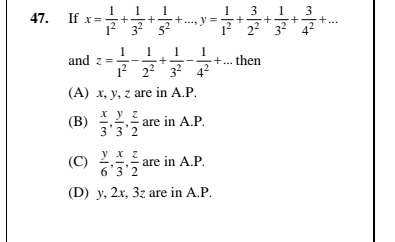Question
Question: If $x = \frac{1}{1^2} + \frac{1}{3^2} + \frac{1}{5^2} + ..., y = \frac{1}{1^2} + \frac{3}{2^2} + \fr...
If x=121+321+521+...,y=121+223+321+423+... and z=121−221+321−421+... then

x,y,z are in A.P.
3x,3y,2z are in A.P.
6y,3x,2z are in A.P.
y,2x,3z are in A.P.
Options (C) and (D) are correct. In option (C), 6y=3x=2z=24π2, so they are in A.P. In option (D), y=2x=3z=4π2, so they are in A.P.
Solution
Here's how to solve this problem:
-
Define S=∑n=1∞n21=6π2.
-
Express x in terms of S: x=∑n=1∞(2n−1)21=S−∑n=1∞(2n)21=S−41S=43S=436π2=8π2.
-
Express y in terms of x and S: y=∑n=1∞(2n−1)21+∑n=1∞(2n)23=x+43S=8π2+436π2=8π2+8π2=4π2.
-
Express z in terms of x and S: z=∑n=1∞n2(−1)n+1=∑n=1∞(2n−1)21−∑n=1∞(2n)21=x−41S=8π2−416π2=8π2−24π2=242π2=12π2.
-
Check options for A.P. condition (2b=a+c):
-
(C) 6y,3x,2z: 6y=6π2/4=24π2 3x=3π2/8=24π2 2z=2π2/12=24π2 Since all terms are equal, they are in A.P. (common difference 0).
-
(D) y,2x,3z: y=4π2 2x=2(8π2)=4π2 3z=3(12π2)=4π2 Since all terms are equal, they are in A.P. (common difference 0).
-
Both (C) and (D) are correct options.
